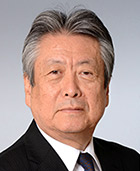
In the May 2018 general meeting, I was re-elected as Chairman of the Otorhinolaryngolical Society of Japan (hereafter, Society), and took charge for another two years at the helm. It is my goal to make the Society even more appealing.
With around 11000 general members and around 8800 medical specialists, this Society is affiliated with 16 other Societies. Its contributions to developments in wide-ranging areas of medicine are worthy of special mention. Besides providing Japanese citizens with quality medical care in the fields of otorhinolaryngology and head and neck surgery, the Society has also been active in encouraging international exchange and been a strong proponent of scholarship and lifelong learning. In addition to these academic contributions, the 22 committee members have also taken the lead in working efficiently together to soundly manage the Society, while proactively contributing to communities by helping resolve issues with school health, welfare and medical services for the young and old, and social insurance medicine.
It is an important duty of otorhinolaryngology and head and neck surgery professionals to straddle a wide range of disciplines encompassing the senses of hearing, smell, taste, and touch. They need to frequently treat diverse ailments with procedures such as functional reconstructive surgery (to enable the functions of speaking, swallowing, etc.) for mouth cavity and throat tumors, and also other conditions of the head and neck regions, and also treat patients of all ages, from infants to the elderly.
In the era of the aging society and improved life expectancy, swallowing impediments and declining sense organ functions caused by deafness or impairments of the senses of balance, smell, and taste have serious effects on the QOL, ADL, and cognitive functions. The Society is expected to play a major role in preventing and improving these societal problems.
Historically, Japan was the first country in the world to introduce the otorhinolaryngology discipline and medical system. After returning from studying abroad in Europe in 1893, Dr. Eigoro Kanasugi (the Society's first president) established the field of otorhinolaryngology for combined treatment of diseases of the ears, nose and throat, which used to be three separate sciences in Europe at the time. He also founded the forerunner of this Society, the "Tokyo Otorhinolaryngology Association," and launched the academic journal, "Otorhinolaryngology Journal," which was the basis for the modern-day Nippon Jibiinkoka Gakkai Kaiho. The Society and journal have trodden the long journey of 125 years.
Owing to the unstinted efforts of our predecessors for 125 years, this Society has made steady progress. It is my goal to strengthen the three pillars of "academic promotion," "cultivation of quality specialists," and "trustworthy medical care," by implementing cutting edge research and cooperating with the development and implementation of advanced medical treatments. It is also my important aim to contribute meaningfully to Japan's aging society and promote the careers of female physicians. I also propose to implement speedy reforms to tackle the many problems associated with the management of this Society, such as by strengthening our financial foundation for more stable and active management.
I shall coordinate organically with the departments in boundary domains to build a medical network through which university hospitals, flagship hospitals, and clinics can complement each other while fulfilling their respective functions and roles. Along with the enrichment of regional medicine (emergency care, home care, and welfare medicine, such as medical examinations and school health), close coordination among scientific societies, regional associations and medical societies is essential to achieve a trustworthy medical system as the structure of a national medical society network takes shape. As we move toward our 150th anniversary, I propose to proactively tackle this Society's serious challenges to create even more trustworthy otorhinolaryngology practices and thereby contribute to the health, medical treatment, and welfare of the Japanese people in this changing environment. I therefore pray for your understanding and cooperation.
Hiroshi Moriyama, MD, PhD
Chairman, Board of Directors
The Oto-Rhino-Laryngological Society of Japan, Inc.
(July 31th, 2018)

